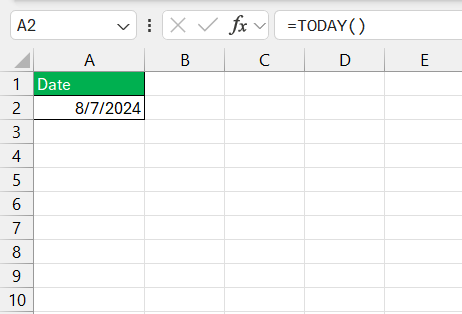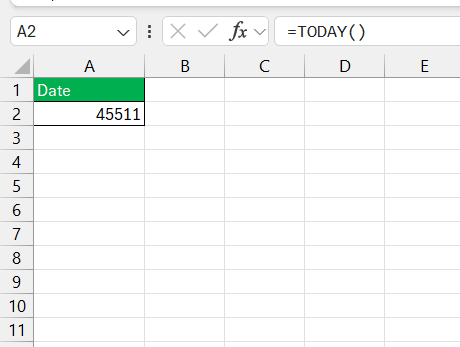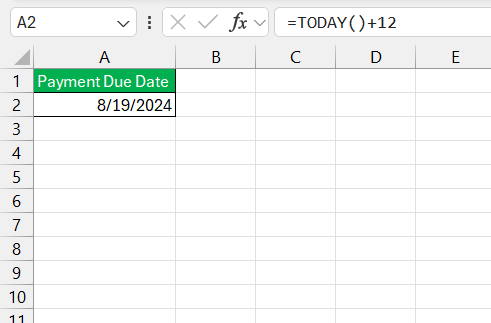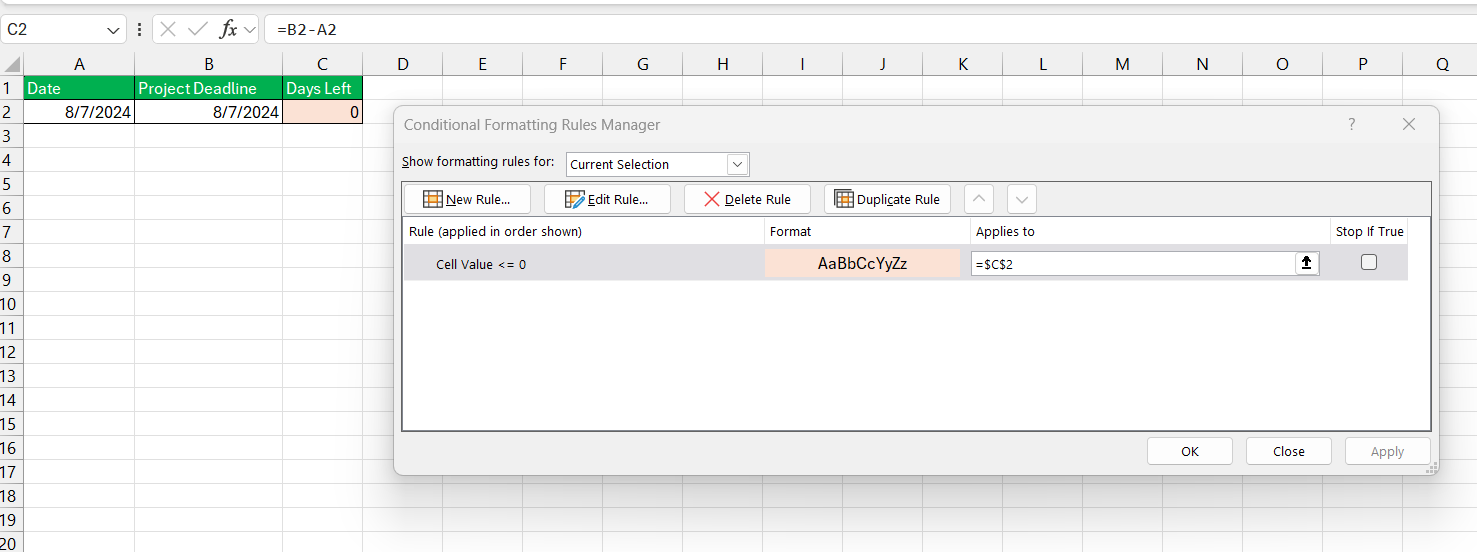When working with spreadsheets, I often need to keep my dates current and accurate. Excel’s TODAY function has been a game-changer for me, making this task effortless. By using this simple yet powerful function, I can ensure that today’s date is always correctly displayed without any manual updates. Here’s a quick look at how the TODAY function can streamline my workflow.
Key Takeaways:
- Excel’s TODAY function effortlessly keeps my dates current and accurate.
- Using =TODAY() in a cell automatically updates the date every time I open my worksheet.
- TODAY date simplifies planning by helping me set timelines and track deadlines.
- Conditional formatting with TODAY highlights current dates for better visibility.
- Keyboard shortcuts like CTRL + ; can insert static dates quickly, avoiding unwanted updates.
Introduction to Excel’s TODAY Function
Simplifying Date Insertion
I often feel bogged down by the mundane task of keeping dates updated in my spreadsheets. Luckily, Excel’s TODAY function is my time-saving superhero. By simply using this function, inserting today’s date into my worksheets becomes effortless.
Today Function at a Glance
The TODAY function in Excel is deceptively simple yet supremely powerful. It serves one primary purpose: providing me with the current date anytime I open my Excel worksheet. There’s no need for manual entry or updates. Simply inputting =TODAY() into a cell displays today’s date in my chosen format, refreshing each time I access the document.
The Power of TODAY in Daily Spreadsheet Tasks
Automatic Updates: Keeping Data Fresh
Imagine having a personal assistant who makes sure your data is never outdated: that’s what the TODAY function does for your Excel sheets. With automatic updates in play, you can rest easy knowing that every time you crack open your spreadsheet, the dates are as fresh as the morning coffee. Gone are the worries of stale, outdated information hampering your analysis or reports.
Smart Planning: Using TODAY for Timelines and Deadlines
Smart planning becomes a breeze when you harness the cleverness of the TODAY function in Excel. You can set up timelines and visually track approaching deadlines with ease. Think of it as your silent project manager, calmly highlighting crucial dates and keeping your project on the straight and narrow.
Step-by-Step Guide to Using TODAY Function
Basic Syntax of TODAY Function
The basic syntax for the TODAY function couldn’t be more straightforward – simply type =TODAY() into a cell, and press Enter.
No parameters, no fuss. Remember, Excel treats dates as serial numbers, so you’ll be greeted with what appears to be a random number at first. Don’t panic! Format the cell with the date format you prefer, and the number transforms into a recognizable date format before your eyes.
Practical Examples: Today’s Date in Action
See the TODAY function shine when you put it into practical use. Imagine you need to create a “Payment Due” column in a billing spreadsheet. By adding a fixed number of days to =TODAY(), you can automatically calculate each bill’s due date.
Or, let’s say you’re tracking project milestones – by subtracting or adding days from the TODAY function, you can project future milestones or reminisce over past achievements with pinpoint accuracy.
Enhancing Your Worksheets with Today’s Date
Highlighting Current Dates for Visibility
If your eyes tend to play hide and seek with current dates in a sea of data, Excel’s conditional formatting, anchored by the TODAY function, comes to the rescue. By setting up a rule that highlights cells containing today’s date, you can make them pop out instantly; a fantastic visual cue for deadlines that demand immediate attention or for distinguishing today’s agenda in your planner.
Calculating Intervals With Precision
Forget the old-school counting on fingers; calculating intervals between dates with precision is where the TODAY function really flexes its muscles. Whether you’re figuring out how many days are left before a special event or tracking the tenure of a subscription, TODAY combined with simple subtraction or addition gives you the desired interval instantly. It’s meticulous precision without breaking a sweat.
TODAY Function Tips and Tricks
Avoiding Common Pitfalls with Static Dates
While dynamic dates keep your data sprightly, static dates have their place, grounding your data where consistency is key. Avoid the pitfall of dates dancing with each reopening of your file by inserting static dates using shortcuts like Control + ; for the current date, and Control + Shift + ; for the current time. This way, you etch those numbers in stone, making historical records or fixed deadlines immune to the whimsy of change.
Keyboard Shortcuts for Speedy Data Entry
Don’t let your productivity be hampered by the slow progression of mouse clicks; instead, embrace the efficiency of keyboard shortcuts. Enter today’s date with a fleet-footed CTRL + ; or stamp the current time with an agile CTRL + SHIFT + ;. If you need to pin down both date and time in a cell, CTRL + ; followed by Space and CTRL + SHIFT + ; will do the trick. These swift keystrokes are perfect when time is of the essence and you need that data posthaste.
Beyond Basics: Advanced Uses of TODAY in Excel
Dynamic Financial Modeling with TODAY
In the realm of financial modeling, TODAY isn’t just a date; it’s a temporal anchor. By using TODAY, you can dynamically discount cash flows and accurately calculate the net present value (NPV) of investments. It ensures the timing of cash entries is precise, which can significantly affect valuation results. Embed TODAY in your models, and watch as they adapt each day, providing up-to-date insights into your financial landscape.
Project Management Made Easier
Streamlining project management becomes second nature when you integrate the TODAY function into your workflow. By basing project timelines, deadlines, and status updates on the dynamic TODAY function, you ensure your project dashboard reflects real-time progress against the plan. Embedding TODAY in Gantt charts or task trackers makes identifying overdue tasks and upcoming deadlines straightforward, keeping your project management sharp, on track, and stress-free.
FAQs: Answering Your TODAY Function Queries
How do you get the day of today in Excel?
To get the day of today in Excel, use the DAY function combined with the TODAY function by typing =DAY(TODAY()) into a cell. This formula will give you the day of the month for the current date.
How do I prevent TODAY from updating?
To keep the TODAY function’s date static, convert it to a fixed value by pressing CTRL + ; to insert the current date as a non-updatable value. This way, the date won’t change when the worksheet recalculates or is reopened.
Can TODAY be used to trigger conditional formatting?
Absolutely, the TODAY function can trigger conditional formatting in Excel. Use it to create rules that highlight or format cells based on the current date, enhancing dashboard visibility and deadline management.
Is it possible to subtract or add days to TODAY’s date?
Yes, it is possible to subtract or add days to TODAY’s date in Excel. For instance, to add 7 days, use =TODAY()+7, or to subtract 7 days, use =TODAY()-7.
What differentiates TODAY from the NOW function?
TODAY gives you the current date without time, updated upon worksheet recalculations. NOW provides the current date and time and also updates dynamically. Use NOW when precise time is essential to your data.
John Michaloudis is a former accountant and finance analyst at General Electric, a Microsoft MVP since 2020, an Amazon #1 bestselling author of 4 Microsoft Excel books and teacher of Microsoft Excel & Office over at his flagship MyExcelOnline Academy Online Course.











